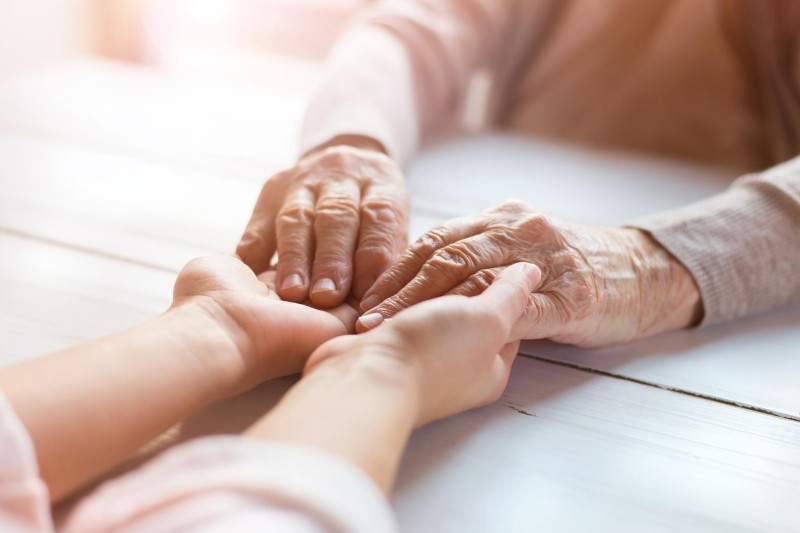Asset Publisher
Coping Strategies for Caregivers After the Death of a Loved One
By Sarah Nicolay | 01/15/2021

An older adult holding hands with and taking comfort in a loved one
Everyone grieves in their own way after the death of a loved one. There is no normal timeline for grief. We may feel sadness, frustration, guilt or even failure and anger. We may want to be loud or quiet; alone or surrounded by community. We may experience insomnia, loss of appetite or even have difficulty breathing. There are a lot of normal reactions to grief, both physically and mentally. We should give ourselves permission to express our grief however we are feeling it, whenever we are feeling it. Grief is messy, but as we navigate the grief of losing a loved one, it is important to connect with resources that can help us through this time.
1. Family and Friends
We don’t need to be afraid to ask for help when we need it. Some people may want to help, but just don’t know how, so it can help to communicate to them the support or comfort we may need. We should accept help if it is offered. We can have a meal together with someone we care about, or plan an outing on days that may be especially tough. We might also consider activities we can do with family and friends to honor or remember a loved one who has passed.
2. Spiritual Communities
Religious activities may be comforting during mourning. We might consider reaching out to a clergy member or a member of our faith community for support. Prayer or meditation can also offer comfort. If we are looking for other avenues of spiritual healing, we can try practices like Reiki—a Japanese technique of stress reduction, relaxation and healing—or guided imagery.
3. Helplines
If we are not ready to share our feelings with loved ones or neighbors, there are helplines that offer support and someone to talk to. Sometimes just talking about a loved one with someone else can provide solace during times of loss. More information on available helplines can be found at The Grief Resource Network.
4. Support Groups
These can be found in many places in our community, including disease-specific organizations, such as the Alzheimer’s Association, churches, local hospitals, counseling centers and hospice care agencies. These groups are a great way to express our grief with other people who are going through similar experiences.
5. Medical Professionals
If we feel our grief is overwhelming, seek help from medical support services. We may be more susceptible to depression, anxiety and illnesses during this time. If we or a loved one are suffering from severe depression or having suicidal thoughts, we should seek medical help immediately. There are always options to get us through a crisis.
The holidays and the following months can be a particularly hard time of year after the loss of a loved one. Everyone experiences grief and loss differently and there are resources available to us if we need them. If we have recently lost a loved one, we might also keep in mind these tips from the Alzheimer’s Association and National Hospice and Palliative Care Organization:
- Avoid making any big decisions in the early months, such as moving or changing jobs.
- Keep items that our loved one treasured to remind us of them.
- Take time to reflect and try not to become isolated.
- Remember there is always help available if we ask for it.
Related Assets
Suggested Reads
A Caregiver’s Journey Through Hospice Care
There are many misconceptions about hospice care in the United States. When my mom’s cancer became a terminal diagnosis, I was grateful that I had a working knowledge of hospice services so my family and I could focus on her quality of life and pain management...
From Caregiving to Widowhood: Balancing Grief and Wellness
One of the biggest challenges of being a caregiver is coping with the fear of losing a loved one. When that loss becomes a reality, the effects can be devastating. Those who provide care for their spouses can have a particularly difficult time coping with grie...
Preparing Your Home for Hospice
If the loved one we care for is in the advanced stages of a disease and we’ve decided that we would like them to be in as much comfort as possible in familiar surroundings, home hospice may be the right choice. However, arranging a loved one’s home or our own ...
Understanding and Coping with Ambiguous Grief as a Caregiver
Loss is not an unfamiliar concept, as we all experience it in some form through relationships with people and changes in our health. Grief is described as a process that we go through to cope with, move through and move on from a significant loss. However, the...
